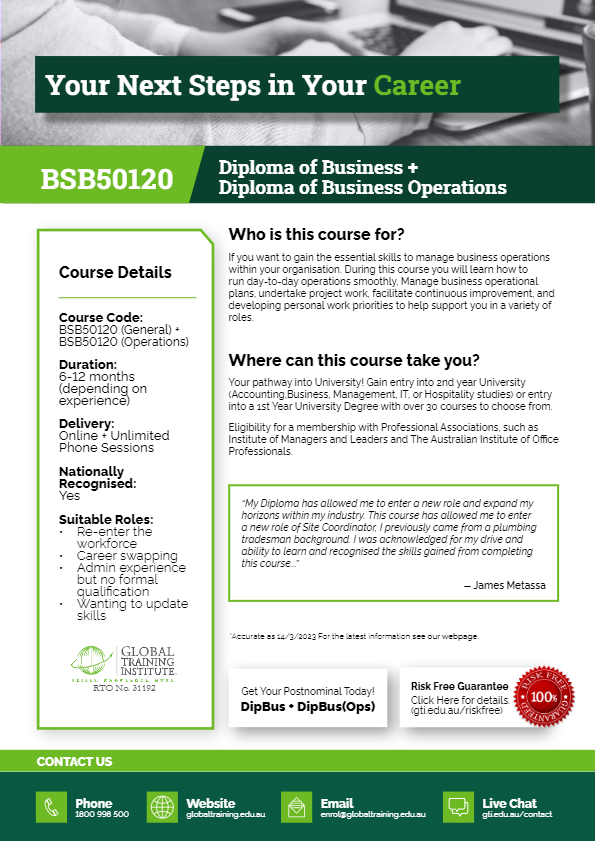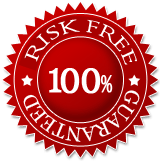Great for Managers, Supervisors, and Team Leaders in all industries
Where can this course take you?
This business course could be the key to solve your current career
frustrations and assist you to advance your career across a wide range of
industries.
Your pathway into University! Gain entry into 2nd year University (Accounting,
Business, Management, IT, or Hospitality studies) or entry into a 1st Year
University Degree with over 30 courses to choose from.
Eligibility for a membership with Professional Associations, such as Institute
of Managers and Leaders and The Australian Institute of Office Professionals
View our Career Pathways guide to see how you can use your experience to gain qualifications and progress your career.
Download Your
FREE Course Guide Now
Code: BSB50120
Units: 12
Length: 6 – 12 months
Start Dates: Flexible, year-round
RPL Available: Yes
Delivery: Online
Funding Assistance: Click Here
Download Your
FREE Course Guide Now
Code: BSB50120
Units: 12
Length: 6 – 12 months
Start Dates: Flexible, year-round
RPL Available: Yes
Delivery: Online
Funding Assistance: Click Here
Need a new job?
Do this course to help you stand out for jobs in management positions and any position that requires the skills of running day to day operations.
Where can this course take you?
This business course could be the key to solve your current career
frustrations and assist you to advance your career across a wide range of
industries.
Your pathway into University! Gain entry into 2nd year University (Accounting,
Business, Management, IT, or Hospitality studies) or entry into a 1st Year
University Degree with over 30 courses to choose from.
Eligibility for a membership with Professional Associations, such as Institute
of Managers and Leaders and The Australian Institute of Office Professionals
View our Career Pathways guide to see how you can use your experience to gain qualifications and progress your career.
Develop your Career in Business Operations
Who is this course for?
If you want to gain the essential skills to manage business operations within
your organisation. During this course you will learn how to run day-to-day
operations smoothly, Manage business operational plans, undertake project
work, facilitate continuous improvement, and developing personal work
priorities to help support you in a variety of roles.
Who is this course for?
If you want to gain the essential skills to manage business operations within
your organisation. During this course you will learn how to run day-to-day
operations smoothly, Manage business operational plans, undertake project
work, facilitate continuous improvement, and developing personal work
priorities to help support you in a variety of roles.
Course Overview
COURSE:
BSB50120 Certificate IV in Business
BSB50120 Certificate IV in Business (Operations)
CODE: BSB50120
IDEAL FOR: Young People, Re-enter the workforce, career swapping, admin experience but no formal qualification, wanting to update skills.
UNITS: 12
DURATION: 6-12 months (depending on experience)
DELIVERY: Online + Unlimited Phone Sessions
ENTRY REQUIREMENTS: Over 18
RPL: Yes
START DATES: Flexible, Year Round
FUNDING ASSISTANCE: Click Here
This practical program provides skills, knowledge and support so that you can implement strategies used by team leaders and managers alike. The practical skills learnt will make a REAL difference to:
- Manage business operational
plans - Undertake project work
- Apply communication strategies in the workplace
- Using digital technologies
to collaborate in a work
environment - Ensure a safe workplace for a
work area
Units
There are 12 units in this qualification. Your units may differ depending if you have credits, if you are completing another qualification also at the same time or if you have chosen different electives.





